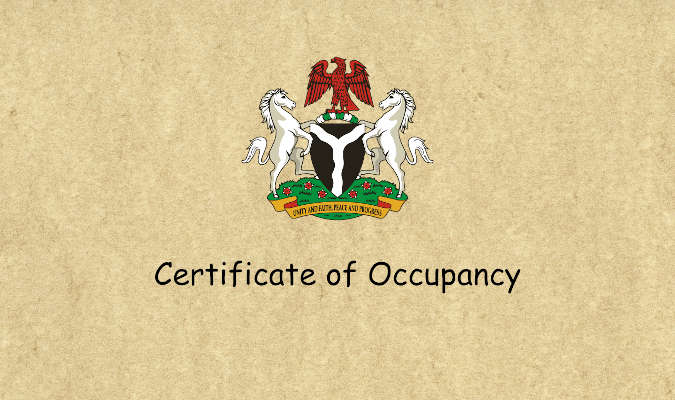
I know you own a landed property or you desire to own one some day and I also know that you might have heard from estate developers, surveyors, land sellers or even lawyers that Certificate of Occupancy (CofO) of the land you acquire grants you a root of title as an evidence that you are the legal owner of the land or proves that you are the owner of the land.
Well, I’m not a bearer of bad news but the bad news is that the Certificate of Occupancy doesn’t prove ownership as it is not enough to grant you a good root of title and it’s not ultimate prove that you are the legal owner of the land. It only raises a presumption of ownership in your favor which can be rebuttable. So take it from me that the certificate of occupancy of the property you own or you intend to own doesn’t really prove or show you are the owner of the property.
This rule was established by the Supreme Court while upholding the decision of the Appeal Court in the case of Joshua OGUNLEYE v. Babatayo ONI (S.C. 193/1987)[1990] NGSC 63. The court in it’s dictum stated and I quote; “however, a general statement that may be made about the certificate of occupancy is that it raises a presumption in favour of the holder; albeit a rebuttable presumption that the holder has a right of occupancy”- per Belgore Jsc.
Register for Tekedia Mini-MBA edition 18 (Sep 15 – Dec 6, 2025) today for early bird discounts. Do annual for access to Blucera.com.
Tekedia AI in Business Masterclass opens registrations.
Join Tekedia Capital Syndicate and co-invest in great global startups.
Register for Tekedia AI Lab: From Technical Design to Deployment.
In the above case, Mr Joshua Ogunleye bought a land from a community who was proven does not have the ownership of the and therefore cannot sell the land as the land belongs to Babatayo Oni’s father.
Mr. Ogunleye after the purchase of the land acquired a certificate of occupancy on the land from the state government and started developing the land.
Mr. Oni the rightful owner of the land got to know that his land has been sold by the community without his consent went to the land and demolished the structures already erected on the land by Ogunleye. Ogunleye took Oni to court for trespassing on his land.
At the high court, the court held that by the reason of Joshua Ogunleye acquiring the certificate of Occupancy on the land he’s the bonafide and legal owner of the land. Damages was awarded to him against Mr. Oni for Trespass.
Mr. Oni went on appeal, the court of appeal reversed the decision of the high court and established that although Ogunleye acquired a certificate of occupancy on the land in question which raises the presumption that he is the legal owner of the land but you cannot acquire a property from the wrong means and get a certificate of occupancy to cover it up. When you acquire a property from the wrong owner, even if you get a certificate of occupancy on that property it won’t prove you are the rightful owner.
The matter went on to the Supreme Court were the court upheld the judgement of the court of appeal and reemphasizing that certificate of occupancy alone is not an evidence of ownership or a good root of title, you must show that you acquired the property from the rightful owner before the certificate of occupancy comes into play.
His Lordship Nnaemeka Agu Jsc in his dictum stated; “This appeal by the plaintiff brings into focus what is required to prove by a plaintiff who relies upon a grant for his proof of title to land. Incidentally, it exposes the weakness of a certificate of occupancy which has been granted where the grantee has no title to the land”.
By this judgement, the Certificate of Occupancy granted to a purchaser of land does not confer any title on him if the seller of the land have no title to the land or not the rightful owner of the land in question as it is he rule that you cannot give what you don’t have (Nemo dare potest quod non habet).
My best advice (out of goodwill) to you is to always consult a lawyer before you get into any transaction, it will save you a lot.
JOSHUA OGUNLEYE V BABATAYO ONI (S.C. 193/1987)[1990] NGSC 63 (27 APRIL 1990).




great article
I’m glad you got something from it.
Thank you “as it is the rule that you cannot give what you don’t have”. Hmmm
Nemo dare potest quod non habet
What document proves ownership of land beyond debate please?
Thanks in anticipation of your response on this topic sir.